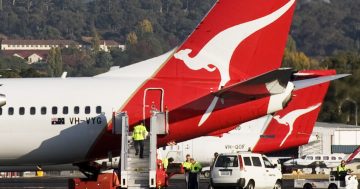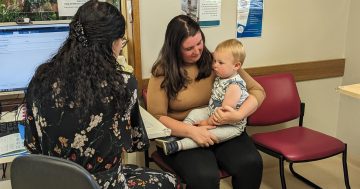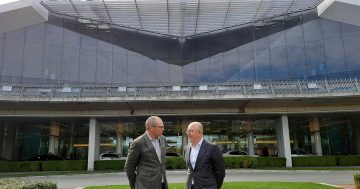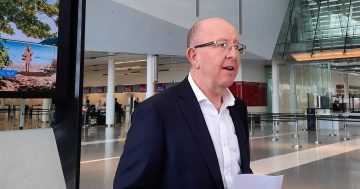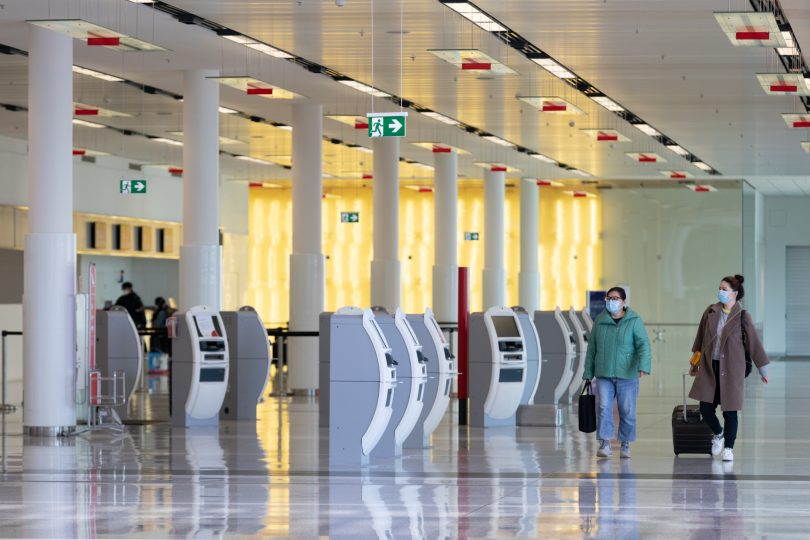
Canberra Airport wants all of its staff to be vaccinated against COVID-19. Photo: Thomas Lucraft.
UPDATED 2:50 pm: New grants for businesses impacted by the lockdown have been announced amid growing impatience from business and industry groups, and a push for mandatory vaccination of employees.
Businesses that have had a decline in turnover of 30 per cent or more during the lockdown and have an annual turnover of more than $75,000 per annum can now apply for grants of up to $10,000 for employing businesses and up to $4,000 for non-employing businesses.
The ACT Government estimates that about 10,000 local businesses could be eligible for the grants, with 8,500 local businesses already expressing an interest in the $75 million scheme, funded 50/50 by the ACT and Commonwealth governments.
Businesses can apply for the grants through the ACT Government’s Business hub.
The Canberra Business Advice and Support Service is also available for any local business owners seeking free, specialised advice on their circumstances.
Chief Minister Andrew Barr said the government was still waiting to hear back from the Commonwealth on a range of further proposals to help struggling businesses.
He understood the predicament businesses of all kinds were facing, but there were no easy choices.
“The alternative scenario is to have done what NSW did and there, three months into lockdown, are a thousand new cases a day, a health system bursting at the seams, and economic activity is absolutely flattening.
“We’re not doing that. What we will seek to do as we step through the next three months is to, within the risk we can bear, increase economic activity.”
Mr Barr said there could be no return to normal until the community was fully vaccinated.
“So to all the businesses, I understand, but we’ve got to do this, we’ve got to protect our community, so please get vaccinated.”
But Mr Barr stopped short of backing business plans to make vaccination mandatory for staff.
Canberra Airport now has more than 90 per cent of its staff who have had at least one shot.
This comes after contacting all staff and businesses operating at the Airport in July that all workers would need to be vaccinated, as well as those on the company’s construction sites.
Mr Barr said that while he supported employers encouraging and helping staff to get vaccinated, now was not the time, with vaccine supply still an issue, to have a debate about making it mandatory.
He also said the issue of business owners refusing service to unvaccinated customers was a complex legal question that he would not be wading into.
Canberra Airport CEO Stephen Byron said that it was important for the airport to be made as safe as possible for when borders are reopened.
“We need to put a case to the premiers that our airport is safe, and the best way to do that is for Canberra to be 80 per cent vaccinated, and our airport to be almost 100 per cent vaccinated,” he said.
Mr Byron said there had been a strong response from staff and businesses, with exemptions for those with medical conditions.
He said many young construction workers had gone to the pharmacy for an AstraZeneca shot.
“Young people have realised that to get their life back, their job back, they need as a community to get on with getting vaccinated,” he said.
He said the Airport was only one of many businesses now backing mandatory vaccination for staff.
UPDATED 12:30 pm: There is a palpable sense of relief among the ACT’s health authorities today as the ACT records 14 new COVID-19 cases, all linked to existing cases or clusters and with only one briefly infectious in the community and considered a low risk.
However, nine people are now hospitalised, including a woman in her 40s who is in a critical condition on breathing support.
Despite the ACT outbreak looking stable, Chief Minister Andrew Barr continued to urge caution at today’s press briefing.
Some mild easing of restrictions is likely after Chief Health Officer Dr Kerryn Coleman briefs the ACT Cabinet today.
The NSW regional lockdown has been extended and Mr Barr said it appeared mistakes from Sydney’s slow lockdown had not been repeated in the regions.
“What we need to do over the next three months is buy the time the unvaccinated need to get vaccinated,” he said, noting that 60 per cent of Canberrans over 12 years of age still need to be fully vaccinated.
“That’s a lot of people we’ve got to protect,” he said.
“I can say there will not be a significant easing of restrictions but a gentle step forward that will remain the case through spring.
“We’re not going to be in a position, given vaccination rates and what’s occurring all around us, to go back to where we were before,” Mr Barr said, adding that it remains likely that the ACT will be the first jurisdiction to reach vaccination targets.
“What we need to do now is restrict interaction between people as much as possible. We do this to reduce the transmission potential”.
There will be further announcements next week about likely restrictions after 2 September.
Yesterday 5960 tests were conducted in the ACT and waiting times are currently quite low. Around 4000 vaccine doses continue to be administered every day in Canberra, and 37 per cent of people 12 years and older have received both doses.
Mr Barr said that planning for vaccinating 12 to 15-year-olds was now well advanced and there have been more than 20,000 registrations for 16 to 29-year-olds. Those cohorts will both be included in the ACT’s 80 per cent vaccination target, but the Chief Minister warned that a shortage of Pfizer might slow progress.
The latest data indicates 95 per cent of Canberra’s 75-years-olds and over have received their first dose. Around 82 per cent of the ACT’s residential aged care staff have received at least one dose of vaccine, a significant improvement in a very short period of time.
Deputy Chief Health Officer Dr Vanessa Johnston said of the ACT’s 14 new cases, 12 are household contacts while the remaining two come from existing clusters. There are now more than 7000 close contacts and 4300 casual contacts in quarantine, and 420 exposure locations across the ACT.
“I think the trend is in the right direction,” she said.
“The lockdown is working and people are abiding by those lockdown measures.”
There has been very little change in the breakdown of cases and no additional cases in the disability sector or at the Bright Bees Early Childhood Centre. The largest sites of transmission thus far remain the Lyneham High School cluster, now standing at 41 cases, and Fiction Nightclub (33 cases).
Health Minister Rachel Stephen-Smith said that there have also been no further cases at the Greenway View Aged Care facility.
All close contacts at the University of Canberra Hospital have returned negative results but remain in quarantine. Ms Stephen-Smith said that all patients had also been tested as an additional precaution.
“For the entirety of Spring, very careful management is going to be necessary,” Mr Barr said.
“It will be a delicate balancing act over the next few months to step out gently as the epidemiology allows, balanced against the risk of the virus coming back in and sparking another outbreak.
“There remains a high degree of uncertainty about what we are going to face locally and what will play out around us in NSW and around the nation”.
“We don’t know what’s going to transpire – all we can do is plan, prepare and reduce risk”.
Mr Barr said that the business support grant scheme opened today via the ACT’s online business hub. The quality of the application and details would assist quick decision-making and payments, but Mr Barr said the government was highly alert to the possibility of scamming.
Those who are unable to earn an income should be able to access payments through the Services Australia disaster payment and the ACT Government is encouraging the Commonwealth to broaden access to younger people and certain visa classes. Mr Barr thanked industry stakeholders and unions who have been engaging with the government to work through fine details of the COVID-safe arrangements for their sector.
The Chief Minister said detailed discussion had taken place with many individual businesses about contactless trading but added that the government had always said a focus on health measures for the first two weeks would be critical.
“Every decision that eases that and sees more movement of people slightly increases the risk. If we take too much risk and allow too much activity, case numbers will increase and we have to go back into a hard lockdown. We’ll balance these issues for the entirety of Spring”.
11:55 am: The ACT has recorded 14 new COVID-19 cases in the 24 hours to 8:00 pm last night.
Chief Minister Andrew Barr made the announcement at the morning COVID briefing. He also reported all cases are linked and 13 were in quarantine during their infectious period.
Just one person was unknowingly infectious in the community for a short period and is considered a low risk.
Nine people are in hospital and some have pre-existing conditions, according to Mr Barr.
One person remains in intensive care in critical condition.
Yesterday, 5964 tests were conducted in the ACT and waiting times are currently quite low. Around 4000 Canberrans yesterday received either a first or second dose of vaccine.
Just over 37 per cent of Canberrans aged 12 years and older have received both doses.
Earlier this morning, NSW recorded 1029 new COVID-19 cases in the 24 hours to 8:00 pm last night – the first time any Australian state hit four-digit cases. NSW also recorded three deaths, a man in his 30s, one in his 60s and one in his 80s.
9:15 am: The small number of new exposure sites listed this morning on the ACT COVID-19 website was a sign the lockdown was working, Health Minister Rachel Stephen-Smith has told ABC radio.
Only three sites in the South.Point shopping centre in Tuggeranong made the list and comes as the government prepares today to rebalance its public health measures as the ACT moves into a third week of lockdown.
The new sites are the Woolworths supermarket last Friday between 11:15 am and 12:45 pm, the Coles supermarket last Monday from 10:10 am to 11:10 am and Liquorland last Monday from 10:30 am to 11:15 am. For full details, visit covid19.act.gov.au.
“I think it is a good sign,” Ms Stephen-Smith said. “We continue to see a reduction in the number of exposure sites that are identified and the time periods for which those sites are exposure sites.
“That is lockdown working.”
But she said the ACT still had cases that were infectious for at least part of the community, and that was the number health authorities want to get down to zero.
Ms Stephen-Smith said the government would be announcing changes to the public health measures in response to feedback from the community.
She said restrictions would not be eased but rebalanced. One example would be making it easier for women to access IVF treatment.
There would also be more measures to stop certain people who continue to gather in numbers at retail outlets.
“There may be some things that people can do relatively safely with little intervention or movement across the city that might involve only one or two people at a time,” she said.
“There have also been concerns that people have been using the current rules to actually organise gatherings at a hardware store, for example, where they might come together and end up mingling or browsing.”
The changes will come as the construction industry and business groups press for restrictions to ease.
The Fyshwick Business Association has called on the ACT Government to consider allowing businesses that can operate in a contactless way to re-open.
President Rob Evans said inconsistency around what is essential or not was causing unnecessary harm.
“How is it safer for people to shop in person at, say, a liquor store – which is deemed ‘essential’ – than any other ‘non-essential’ business that is willing and able to provide contactless trade for customers, but is unable to do so without breaching the health direction?”
Ms Stephen-Smith urged people to be patient with the lockdown, saying a short, sharp lockdown is also the best economic response.
The ACT vaccination rate continues to lead the nation and is now at 37.9 per cent of eligible people who have received both shots, followed by NSW at 32.9 per cent.
Ms Stephen-Smith said this showed how the ACT had been working with the Commonwealth and the enthusiasm of Canberrans to get vaccinated.
There was also less hesitancy in Canberra now about the Astra Zeneca vaccine.
“This is really starting to pay off,” she said.
Ms Stephen-Smith said work was progressing on using the AIS Arena as a mass vaccination hub.












